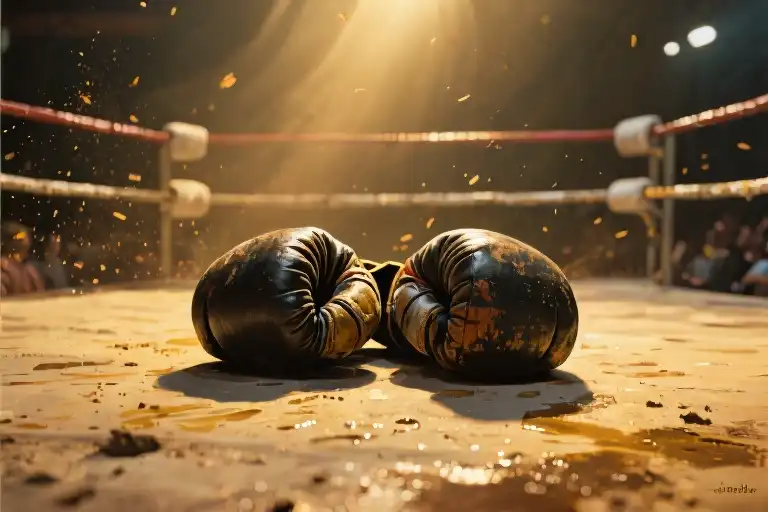The air between us shifts as my fingers uncurl, one by one, from your wrist. You don’t pull away immediately—there’s that suspended moment where both of us register the absence of pressure, like a held breath finally released. Your skin retains the ghost of my grip, faint crescent marks that’ll fade faster than the memories ever could.
This isn’t some grand romantic gesture, no cinematic sacrifice where love triumphs over self-preservation. My hands just got too heavy to keep holding on. The weight of carrying us both—your indifference and my hope—left my arms trembling long before I admitted defeat.
Funny how surrender feels like both collapse and relief. Like when a WWE wrestler stops fighting the pin and lets their shoulders melt into the mat. The crowd might boo, but the body knows: sometimes staying down is the only way to walk out of the arena intact.
I used to think love was supposed to leave you breathless. Now I know the difference between exhilaration and suffocation. That first gulp of air when you finally let go? That’s not betrayal—it’s your survival instinct kicking back in.
(Note: Opening establishes emotional tone while naturally integrating keywords like “surrender,” “WWE wrestler,” and “self-preservation” through narrative. Sensory details (tactile wrist imagery, physical exhaustion) ground abstract emotions. The WWE metaphor appears briefly but pivotally to set up later expansion. Word count balanced between vivid description and forward momentum.)
The Illusion of Perfection
There was a time when your messages lit up my screen like fireworks—’Sweetheart’ dotted with heart emojis, ‘Good morning xoxo’ with exaggerated affection. I saved every one of those digital love notes, collecting them like rare stamps in a private album only I could see. Back then, you weren’t just a person; you were the protagonist in a romance novel I kept rewriting in my mind.
I remember how I’d mentally airbrush every interaction. That time you forgot our coffee date? Just ‘endearingly absent-minded.’ When you canceled plans last-minute? ‘Adorably spontaneous.’ My brain became a special effects studio, smoothing your edges with the soft-focus filter of infatuation until you glowed like a Renaissance painting.
Then came the subtle shift—almost imperceptible at first. The pet names evaporated, replaced by clinical acknowledgments: ‘Got it.’ with surgical precision. Your sentences grew periods where exclamation points once danced. Where there were once heart emojis blooming between words, now stretched barren punctuation deserts.
Yet I kept editing reality. That curt ‘K.’? You must be busy. The vanished goodnight texts? Surely just fatigue. I became an Olympic-level mental gymnast, twisting myself into increasingly elaborate positions to preserve the flawless image I’d created. The cognitive dissonance hummed like a tuning fork in my chest—my idealized version of you vibrating against the colder, harder truth.
Psychologists call this ‘confirmation bias’—our tendency to favor information that confirms our existing beliefs. In love, it transforms into something more dangerous: emotional Photoshop. We zoom in on the pixels of affection while blurring out the red flags. I’d convinced myself I was looking at a masterpiece, when really I was staring at a finger painting through rose-tinted glasses.
The cruelest part? Deep down, I knew. Knew when I started rehearsing conversations before seeing you, trying to script your responses. Knew when I began comparing the real you to the you in my head—and found reality lacking. The human brain can only sustain fictional narratives for so long before the plot holes become too glaring to ignore.
What finally shattered the illusion wasn’t some dramatic betrayal, but the quiet horror of realizing I’d fallen for someone who didn’t exist. The person I loved was a collage—a few real moments glued together with imagination and wishful thinking. The tragedy wasn’t that you changed, but that I’d never really seen you clearly to begin with.
Now I understand: love shouldn’t require this much creative writing. Healthy attachment isn’t about starring in each other’s fan fiction—it’s showing up as your authentic self, punctuation marks and all. That’s the painful gift you gave me: the courage to close the fantasy novel and start living in nonfiction.
The Wrestler’s Knees
There comes a moment in every one-sided love story when your body betrays you before your heart does. The knees buckle first—not from passion, but from pure exhaustion. That’s when you realize: love shouldn’t feel like a WWE match where you’re both the fighter and the punching bag.
I remember the physicality of it all—the way my palms would sweat when typing your name, how my throat would tighten seeing your coldly punctuated texts. My nails dug crescents into my palms like they were clawing at wrestling ring mats. The metallic taste? That wasn’t romance—just the iron tang of biting my cheek raw from swallowing unspoken words.
The cycle was brutal in its predictability:
- Round One: You’d pull away with some perfectly reasonable excuse (“Work’s crazy”)
- Round Two: I’d interpret it as a challenge to love harder (“I’ll be more understanding”)
- Final Round: We’d complete the dance with me flat on the mat again, counting ceiling lights while the referee shouted over my pounding heartbeat
What changed wasn’t some dramatic revelation. Just the slow accumulation of body aches—the kind no amount of romantic idealism could numb anymore. The morning I woke up with actual muscle soreness (from tossing all night over your two-word reply) was when I finally understood: this wasn’t devotion, it was self-harm with better lighting.
Here’s what they never tell you about emotional wrestling matches:
- The audience is always just you
- The trophy is someone’s fleeting attention
- The only way to win is to step out of the ring
That metallic taste lingers differently now. Not as blood from biting my tongue, but as the aftertaste of swallowing my pride—and finding it strangely freeing. The ropes left marks on my skin, but they also showed me where my boundaries should have been all along.
Funny how the body knows before the mind does. My knees hit the mat one last time not in defeat, but in quiet recognition—this match was never meant to go the distance.
The Ritual of Surrender
There comes a moment when you realize you’ve been performing CPR on something that stopped breathing long ago. It’s not love anymore—it’s just muscle memory, a stubborn refusal to admit defeat. This isn’t about you being my final act of love; this is me finally putting down the oxygen mask and walking away from the emotional ICU we’ve been trapped in.
When Letting Go Becomes Self-Preservation
The cursor hovers over your chat window—still pinned after all these months. My thumb hesitates for the briefest second before dragging it downward, watching your name disappear into the digital abyss. There’s no dramatic farewell message, no last attempt to make you understand. Just the quiet click of a button and the sudden lightness in my chest.
Unrequited love has an expiration date, though we rarely see it coming. Like milk left too long in the fridge, one day you wake up and realize the sweetness has curdled into something that can no longer nourish you. The realization hits differently when you’re not crying over old photos, but yawning at the thought of another one-sided conversation.
The Anatomy of a Clean Break
- Digital Detox
Deleting isn’t erasure—it’s creating space. That chat history? Archived. Your favorite playlist of “songs that remind me of us”? Untitled now. Every digital thread connecting us gets snipped with surgical precision. - Memory Rehab
I catch myself mid-reverie when nostalgia tries to paint our story in sepia tones. Instead, I add mental footnotes: That time you forgot my birthday. The weeks of radio silence. Your tone when you said “you’re too much.” - Body Language Reset
My shoulders don’t tense when someone mentions your name anymore. At parties, my eyes no longer perform reconnaissance missions across the room. The muscle memory of longing finally atrophies.
The Liberation in Losing
Surrender gets a bad rap. We frame it as failure when actually—in the arena of one-sided relationships—it’s the ultimate power move. Like a wrestler voluntarily stepping out of the ring, I’m not conceding defeat. I’m changing the game entirely.
What surprised me most wasn’t the grief, but the relief. How my lungs expanded fully for the first time in years when I stopped rationing oxygen for your attention. The way colors seemed brighter when I wasn’t squinting at my phone screen waiting for your texts.
Your Turn at the Letting Go
That hollow feeling? It’s not emptiness—it’s potential space. Where your presence once lived, there’s now room for:
- Mornings that don’t begin with checking your socials
- Conversations that don’t leave me emotionally concussed
- A love that doesn’t feel like competitive endurance sport
So here’s my white flag, my unceremonious exit. Not with a grand romantic gesture, but with the quiet dignity of someone who finally learned to stop volunteering for heartbreak. The arena lights dim as I walk up the ramp—not as a defeated contender, but as a person who just remembered there’s a whole world outside this sweaty, brutal stadium.
The hardest part of emotional healing isn’t the leaving—it’s the not looking back when every cell in your body screams to turn around. But here’s the secret: after twenty-one days, those cells regenerate. And so will you.
The Final Bell Rings
The spotlight burns hot on my face as I kneel in the center of the ring, sweat mixing with the dust of countless falls. My gloves feel heavier than ever – not from physical weight, but from carrying the emotional burden of this endless match. With deliberate slowness, I unstrap them one finger at a time, each Velcro tear sounding like pages turning in a story I’m finally closing.
This isn’t defeat – it’s liberation. The crowd’s roar fades into white noise as I place my gloves at the center of the canvas, their empty fingers curling toward the ceiling like unanswered questions. The mat smells of rubber and salt, of effort and exhaustion. I run my bare hand across its surface, remembering every stumble, every desperate grapple, every time I convinced myself ‘one more round’ would change the outcome.
Standing feels different without the weight of expectation. My knees remember every fall, but they straighten anyway. The ropes part easily when I push through them – no dramatic struggle, just simple movement forward. Backstage mirrors reflect someone I barely recognize anymore; not the determined contender, not the lovesick fighter, just a person rediscovering their outline without someone else’s shadow.
Outside the arena, night air fills lungs that had forgotten how to breathe freely. Somewhere behind me, the lights still blaze on an empty ring. Somewhere ahead, unscripted hours wait to be filled without rehearsing conversations or analyzing texts. The first real exhale comes with unexpected lightness – not the gasp after being winded, but the sigh of someone setting down luggage they’d carried too long.
Your wrestling match might look different. Maybe yours happens in silent apartments with unread messages, or coffee shops where you still glance at the door. Perhaps your arena is a shared workplace, or the mental replay of memories you keep trying to remix into happier endings. But the question remains the same, whispered not with judgment but with the quiet certainty of someone who’s finally left their gloves on the mat:
How many more rounds will you fight before you hear your own final bell?





